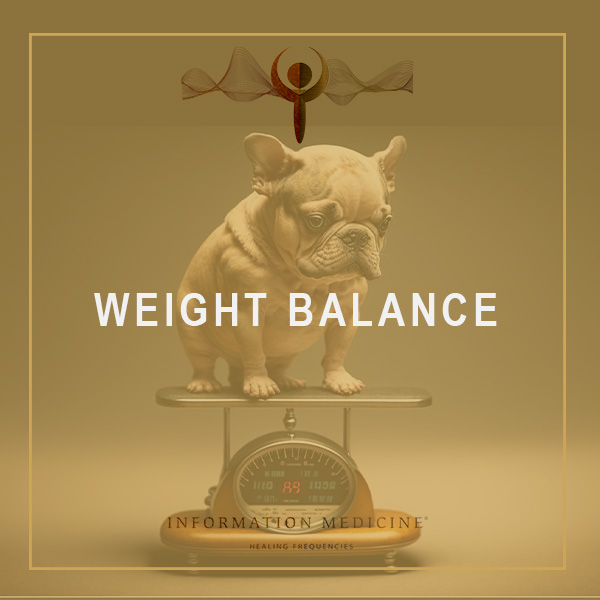This sound file contains the balancing frequencies that relate to finding a healthy balance in your weight, for example by losing weight, gaining weight or maintaining weight better, with the associated functions, emotions, chakras, meridians and other energy systems.
A healthy weight is important for the overall health of an animal. Being overweight can increase the risk of cardiovascular disease, diabetes, and certain types of cancer. It can affect wear and tear on joints and can even cause psychological complaints. Being underweight also entails health risks, due to a possible shortage of nutrients for the body. This can lead to muscle breakdown, reduced immune system, lack of energy, fatigue, lethargy, headache, increased risk of bone fractures and a poorer condition of your skin and hair.
To help an animal gain or maintain a healthy weight, there are a number of things that are important:
- Ensure the correct composition of the microbiome.
- Give the right amount of food, appropriate to the desired weight.
- Provide food that is nourishment and not just filling.
- Give enough exercise.
It is important to first ensure the correct composition of the animal’s microbiome by giving the correct supplements (pre- and probiotics). In most animals (and humans) the microbiome is not in order and there are fungi in the intestines, especially in horses. Only when the microbiome is in order can it optimally support the process of weight balance because only then can it optimally absorb nutrients.
Make a feeding schedule for the animal in which you adjust the amount of feed per day to the desired weight. This is often stated on the packaging of the food. Stop with all the extras and snacks.
For horses, this means that you weigh the hay per day at 1.5-2% of the desired body weight (taking into account the dry matter %). You can gradually reduce this amount to 75% of the daily amount in the case of severe obesity. In the case of underweight, you certainly keep the 2% as a starting point. At first only give an overweight horse a balancer to meet the vitamin and mineral needs and leave out all other feed. No muesli, carrots, apples, sweets, etc.
Grazing is not convenient during a period of weight loss. You have no control over how much a horse eats and horses with insulin resistance, for example, can graze a lot in a very short time. A horse that is underweight can often benefit from grazing. Also consider the bedding of the stable. If your horse is overweight, switch to a form of sawdust instead of straw. This is important because a horse that suddenly gets less hay instead cannot eat extra straw, resulting in impaction colic.
Subsequently, more exercise is often an important next step. With a dog you can easily walk a more often or a little longer a day. You can also get a cat to exercise more by playing with it and, for example, offering some climbing and scratching toys.
With horses you can start with walking, preferably an hour a day, but of course build this up slowly. This is in addition to regular training. In addition, interval training is often very effective. Ideally, you train with a heart rate monitor and make sure that the horse’s heart rate remains between 130 and 150 beats. At this heart rate, the horse will burn fat. Try to do this work out three times a week.
In Eastern medicine, dampness is a condition where the body retains excess fluid. This fluid coagulates into mucus and is eventually converted into fat. Dampness gives a bloated and heavy feeling; it can also give a ‘foggy’ feeling in your head. You may also experience visible mucus such as sinus problems, a chronic cough or asthma. In Eastern medicine, the spleen is the digestive fire. If the spleen is too busy with digestion, it has too little power left to drain fluids. Digestion has priority over the removal of fluid. If there is dampness, it is good to support the spleen extra, for example with certain foods.
This sound file can be combined well with, for example, the sound files Addiction – Stereotypical Behavior, Metabolic Syndrome – Insulin Resistance, Digestion & Metabolism, Align Your Past, Stress, Overstrained & Burnout, Grounding & Relaxation, Inner Balance, Alignment, Freedom, Magdalena Regeneration , Emotional Trauma – PTSD, Vagus Nerve – Microbiome and Pancreas
